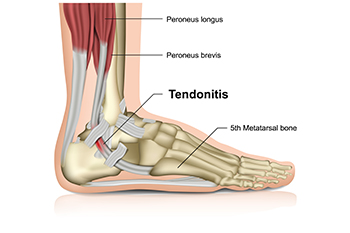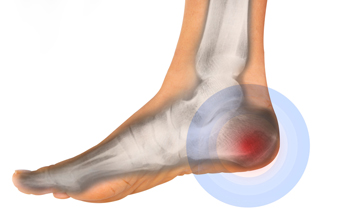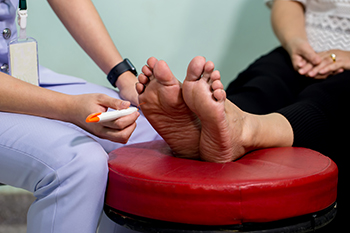Connect With Us
Blog
Items filtered by date: April 2023
Heel Pain and Running

Running can be a good form of exercise and many enjoy this sport. However, like other physical sports, it can have negative effects on one’s feet. Heel pain is a common complaint among runners. This can be caused by overuse, plantar fasciitis, foot structure problems, or poor running form. It is critical that heel pain is treated promptly in runners to avoid further injury and complications. Plantar fasciitis is a condition where the plantar fascia, the ligament that runs from the heels to the toes on the soles of the feet, is overstretched or has slight tears. This results in heel pain, which is often worse after rest. People with flat feet or high arches represent examples of those with foot structure problems that put stress on the plantar fascia and can lead to heel pain after running. There are many other reasons heel pain may affect runners, and if this is something you suffer from, it is suggested that you see a podiatrist who can help you get to the root cause of the pain and offer effective treatment solutions.
Many people suffer from bouts of heel pain. For more information, contact one of our podiatrists of Sutera and Jones Surgical Podiatry. Our doctors can provide the care you need to keep you pain-free and on your feet.
Causes of Heel Pain
Heel pain is often associated with plantar fasciitis. The plantar fascia is a band of tissues that extends along the bottom of the foot. A rip or tear in this ligament can cause inflammation of the tissue.
Achilles tendonitis is another cause of heel pain. Inflammation of the Achilles tendon will cause pain from fractures and muscle tearing. Lack of flexibility is also another symptom.
Heel spurs are another cause of pain. When the tissues of the plantar fascia undergo a great deal of stress, it can lead to ligament separation from the heel bone, causing heel spurs.
Why Might Heel Pain Occur?
- Wearing ill-fitting shoes
- Wearing non-supportive shoes
- Weight change
- Excessive running
Treatments
Heel pain should be treated as soon as possible for immediate results. Keeping your feet in a stress-free environment will help. If you suffer from Achilles tendonitis or plantar fasciitis, applying ice will reduce the swelling. Stretching before an exercise like running will help the muscles. Using all these tips will help make heel pain a condition of the past.
If you have any questions please contact one of our offices located in Media, Glen Mills, Riddle Memorial Hospital, and Concordville, PA . We offer the newest diagnostic and treatment technologies for all your foot and ankle needs.
Signs of an Achilles Tendon Rupture

The Achilles tendon is the longest and strongest tendon in the body, and its job is to absorb a great deal of stress. This tendon connects the muscles in the calf to the heel, allowing you to be active on your feet. A ruptured Achilles tendon is either partially or completely torn, which causes a popping sound and extreme pain behind the heel. This is a common injury to athletes, usually between the ages of 30 and 40, and is more common in men than women. Symptoms of a partially torn Achilles tendon include swelling and bruising at the heel, pain while walking up stairs or hills, and difficulty bearing weight. A fully ruptured tendon, however, stops you in your tracks and requires immediate medical attention. Healing from a ruptured Achilles tendon can take as long as six months. An ankle brace or walking brace is usually prescribed, and surgery may be required to mend the torn tendon. For more information on an Achilles tendon rupture, it is suggested that you consult a podiatrist.
Achilles tendon injuries need immediate attention to avoid future complications. If you have any concerns, contact one of our podiatrists of Sutera and Jones Surgical Podiatry. Our doctors can provide the care you need to keep you pain-free and on your feet.
What Is the Achilles Tendon?
The Achilles tendon is a tendon that connects the lower leg muscles and calf to the heel of the foot. It is the strongest tendon in the human body and is essential for making movement possible. Because this tendon is such an integral part of the body, any injuries to it can create immense difficulties and should immediately be presented to a doctor.
What Are the Symptoms of an Achilles Tendon Injury?
There are various types of injuries that can affect the Achilles tendon. The two most common injuries are Achilles tendinitis and ruptures of the tendon.
Achilles Tendinitis Symptoms
- Inflammation
- Dull to severe pain
- Increased blood flow to the tendon
- Thickening of the tendon
Rupture Symptoms
- Extreme pain and swelling in the foot
- Total immobility
Treatment and Prevention
Achilles tendon injuries are diagnosed by a thorough physical evaluation, which can include an MRI. Treatment involves rest, physical therapy, and in some cases, surgery. However, various preventative measures can be taken to avoid these injuries, such as:
- Thorough stretching of the tendon before and after exercise
- Strengthening exercises like calf raises, squats, leg curls, leg extensions, leg raises, lunges, and leg presses
If you have any questions please feel free to contact one of our offices located in Media, Glen Mills, Riddle Memorial Hospital, and Concordville, PA . We offer the newest diagnostic tools and technology to treat your foot and ankle needs.
Wounds That Don't Heal Need to Be Checked
Children, Sports, and Sever’s Disease

Sever’s disease affects the heel and arch in young children and teenagers. This age group of people is generally active in participating in running and jumping activities, and the growth plate in the heel is affected. It can be painful at the point where the Achilles tendon connects to the heel, and the surrounding muscles grow faster than the growth plate. The pain is often worse during the chosen activity and may feel better when the foot is rested. Parents may notice their child is limping, and they may have difficulty standing on their tiptoes. A physical examination can be done to confirm this condition, which is followed by treatment that begins with temporarily stopping the activity that caused the pain. Performing stretches that can strengthen the calf muscles may help to accelerate the recovery. If your active child has heel pain, it is strongly suggested that you consult with a podiatrist who can offer the best treatment for your child.
Sever's disease often occurs in children and teens. If your child is experiencing foot or ankle pain, see one of our podiatrists from Sutera and Jones Surgical Podiatry. Our doctors can treat your child’s foot and ankle needs.
Sever’s Disease
Sever’s disease is also known as calcaneal apophysitis, which is a medical condition that causes heel pain I none or both feet. The disease is known to affect children between the ages of 8 and 14.
Sever’s disease occurs when part of the child’s heel known as the growth plate (calcaneal epiphysis) is attached to the Achilles tendon. This area can suffer injury when the muscles and tendons of the growing foot do not keep pace with bone growth. Therefore, the constant pain which one experiences at the back of the heel will make the child unable to put any weight on the heel. The child is then forced to walk on their toes.
Symptoms
Acute pain – Pain associated with Sever’s disease is usually felt in the heel when the child engages in physical activity such as walking, jumping and or running.
Highly active – Children who are very active are among the most susceptible in experiencing Sever’s disease, because of the stress and tension placed on their feet.
If you have any questions, please feel free to contact one of our offices located in Media, Glen Mills, Riddle Memorial Hospital, and Concordville, PA . We offer the newest diagnostic and treatment technologies for all your foot and ankle injuries.
Foot Care Can Help to Prevent Diabetic Ulcers

Diabetics can be in danger of foot and toe problems as a result of sustained high blood sugar levels. Commonly, diabetes causes neuropathy in the lower extremities, which results in numbness and can put the patient in danger of developing a foot ulcer. Because the feeling in the feet is limited or absent, cuts, sores, and cracks in the skin may go unnoticed. Another underlying condition, called peripheral artery disease, can clog the blood vessels in the feet, making it more difficult for any such injuries to heal. This combination can lead to skin ulcers that if not attended to can cause gangrene. Experts suggest a daily foot care regime that can prevent ulcers from forming. It includes washing and drying the feet daily, inspecting them for sores, wearing shoes that are comfortable and fit well, and avoiding going barefoot. Keep the feet elevated when possible and perform light foot exercises, such as wiggling the toes and rotating the ankles to get the circulation going. If you have noticed a sore on your foot that is taking a long time to heal, it is suggested that you make an appointment with a podiatrist.
Diabetic foot care is important in preventing foot ailments such as ulcers. If you are suffering from diabetes or have any other concerns about your feet, contact one of our podiatrists from Sutera and Jones Surgical Podiatry. Our doctors can provide the care you need to keep you pain-free and on your feet.
Diabetic Foot Care
Diabetes affects millions of people every year. The condition can damage blood vessels in many parts of the body, especially the feet. Because of this, taking care of your feet is essential if you have diabetes, and having a podiatrist help monitor your foot health is highly recommended.
The Importance of Caring for Your Feet
- Routinely inspect your feet for bruises or sores.
- Wear socks that fit your feet comfortably.
- Wear comfortable shoes that provide adequate support.
Patients with diabetes should have their doctor monitor their blood levels, as blood sugar levels play such a huge role in diabetic care. Monitoring these levels on a regular basis is highly advised.
It is always best to inform your healthcare professional of any concerns you may have regarding your feet, especially for diabetic patients. Early treatment and routine foot examinations are keys to maintaining proper health, especially because severe complications can arise if proper treatment is not applied.
If you have any questions please feel free to contact one of our offices located in Media, Glen Mills, Riddle Memorial Hospital, and Concordville, PA . We offer the newest diagnostic and treatment technologies for all your foot and ankle needs.
Blog Archives
- July 2025
- June 2025
- May 2025
- April 2025
- March 2025
- February 2025
- January 2025
- December 2024
- November 2024
- October 2024
- September 2024
- August 2024
- July 2024
- June 2024
- May 2024
- April 2024
- March 2024
- February 2024
- January 2024
- December 2023
- November 2023
- October 2023
- September 2023
- August 2023
- July 2023
- June 2023
- May 2023
- April 2023
- March 2023
- February 2023
- January 2023
- December 2022
- November 2022
- October 2022
- September 2022
- August 2022
- July 2022
- June 2022
- May 2022
- April 2022
- March 2022
- February 2022
- January 2022
- December 2021
- November 2021
- October 2021
- September 2021
- August 2021
- July 2021
- June 2021
- May 2021
- April 2021
- March 2021
- February 2021
- January 2021
- December 2020
- November 2020
- October 2020
- September 2020
- August 2020
- July 2020
- June 2020
- May 2020
- April 2020
- March 2020
- February 2020
- January 2020
- December 2019
- November 2019
- October 2019
- September 2019
- August 2019
- July 2019
- June 2019
- May 2019
- April 2019
- March 2019
- February 2019
- January 2019
- December 2018
- November 2018
- October 2018
- September 2018
- August 2018
- July 2018
- June 2018
- May 2018
- April 2018
- March 2018
- February 2018
- January 2018
- December 2017
- November 2017
- October 2017
- September 2017
- August 2017
- July 2017
- June 2017
- May 2017
- April 2017
- March 2017
- February 2017
- January 2017
- December 2016
- November 2016
- October 2016
- September 2016
- August 2016
- July 2016
- June 2016
- May 2016
- April 2016
- March 2016
- February 2016
- January 2016
- December 2015
- November 2015
- October 2015
- September 2015
- August 2015
- July 2015
- June 2015
- May 2015
- April 2015
- March 2015
- February 2015
- January 2015
- December 2014
- November 2014
- October 2014
- September 2014

